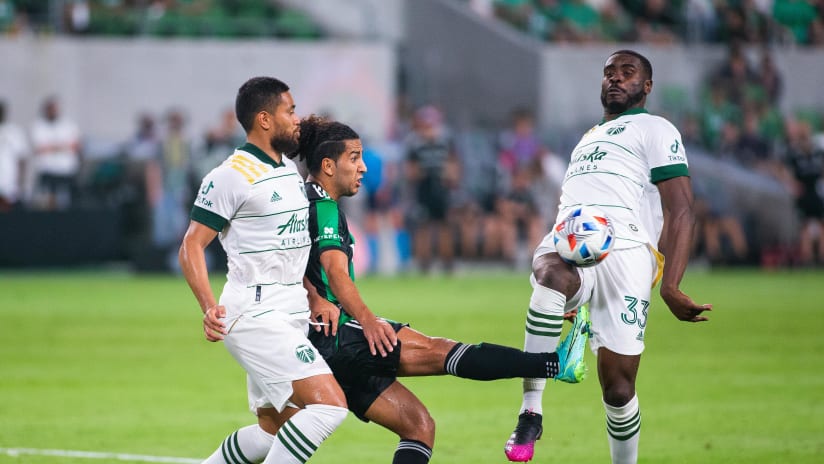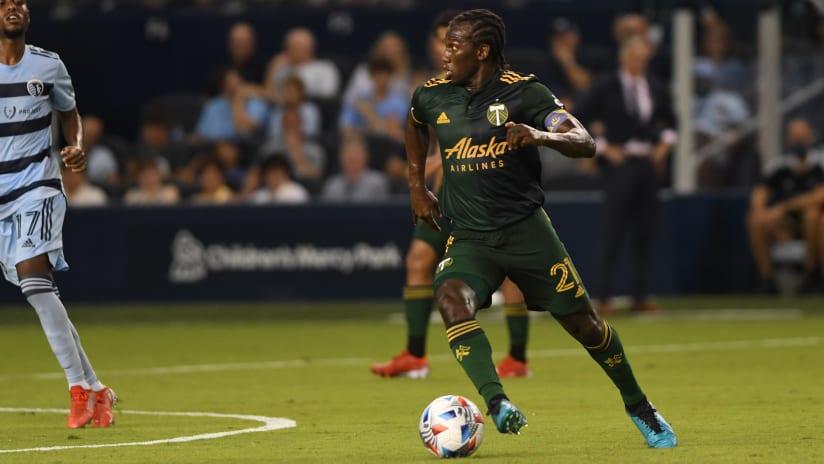After training in Kansas City, Kansas, on Thursday, the Portland Timbers flew to their road trip's final stop yesterday, landing in Austin, Texas, to continue their preparation for Saturday’s game. That’s when they’ll get a rematch against a team that handed them a 4-1 loss on July 1 as well as their regular-seasons first major moment of doubt. Facing Austin FC for the second time this year, the Timbers will hope their recovery can continue.
That recovery had to begin in the moments after Sunday’s 6-2, home loss to the Seattle Sounders and took a step forward on Wednesday, with the Timbers earning a 1-1 draw at Sporting Kansas City. But that result was ultimately a mixed bag. Portland was able to put the Seattle game in the rearview mirror, but in terms of the takeaways from Children’s Mercy Park, the “things to build on” pile felt just as large as the “areas to improve.”
Ahead of Saturday’s 6:00 p.m. Pacific kickoff in Texas, here is little of column A, and a little of column B - some of the pluses and minuses Portland's left with ahead of their second game in Austin:
Area to Improve: Conceding late
Team captain Diego Chara alluded to this tendency after Wednesday’s game, saying that, while Portland did a “very good job,” over the whole game, “once again, at the end of the game, we gave up a goal.” It was the ninth time in 19 games the Timbers have conceded after a game’s 75th minute.
“Unfortunately, [we allowed] that last goal in the last few minutes,” Timbers head coach Giovanni Savarese said after Wednesday’s game, “because I think we maybe deserved the three points [because of] the way we defended and how the team collectively did, today.”
The Timbers need to defend better in general. Only one team in the league has conceded more goals. But when you go 91 minutes without conceding, you also need to continue doing what made you successful.
Portland’s defense was much improved on Wednesday. Now, their defending needs to preserve three points instead of one.
Area to build on: Overall defending
Sporting had 11 corners on Wednesday, and generally, Portland handled them well. I bring that up because set-piece defending has been an issue for the Timbers this season. The 13 goals they've conceded from dead balls is the highest total in Major League Soccer.
But in their last game, set-piece defending was actually a strength. The Timbers were able to absorb pressure after claiming an early lead, be content with giving up set pieces, while defending well when dead-ball chances arose. Improvement will have to be measured over time, but from Wednesday's small sample, Portland seems to have a foundation to build on.
Depending on which source you look at — either the league’s website or the method used by FBRef.com — the Timbers gave up chances equal to 1.4 (FBRef) to 1.9 (MLS) expected goals. That number can be better, but on the road against one of the best attacks in Major League Soccer, it’s not bad, either. If the Timbers continue defending like they did on Wednesday, the team’s overall goal-prevention numbers are going to improve.
Area to Improve: Finishing chances
There were moments in attack the stand out as huge could-have-beens in Wednesday’s second half. Shortly after coming on in the 71st minute, Diego Valeri’s attempt to finish a one-on-one over Sporting goalkeeper Tim Melia was pulled just wide of the left post, keeping the score 1-0. Minutes after Sporting tied the game in extra time, Sebastián Blanco and Claudio Bravo briefly had a two-on-zero toward goal. They didn’t get a shot off
There’s a temptation to see every good chance as ones teams have to bury, when in reality, those opportunities aren't always converted. Still, when a team is up late or has a chance to break a stoppage-time deadlock, the impact of misses gets amplified, because those goals could have been decisive.
Overall, Portland needs to seize their opportunities whenever they come. Because right now, three points feel so different than one.
Area to build on: Taking an early lead
The Timbers are 7-1-2 when scoring first; 1-9-3 when they don’t. That may seem like a shocking disparity, but hey: Welcome to soccer. Goals are incredibly important in such a low-scoring sport, and when you get the first one, you’ve taken a huge step toward getting a result.
Scoring early is also a great way to protect your defense. It should go without saying that, with a lead, you can start prioritizing your goal prevention even more. For teams working to solidify their defense, those new priorities can be valuable.
While the Timbers continue addressing their problems at the back, playing with a lead will be especially important. They did so on Wednesday. Related: Wednesday was one of their two or three best defensive performances this summer.
Area to Improve: Finding places to assert control
Though the Timbers played well without the ball on Wednesday — allowing Sporting to control 69.3 percent of the match’s possession while the hosts chased a goal — there were also moments, particularly in the second half, when some control could have given the team a needed break. Sporting deserve credit for pinning Portland in the Timbers' defensive half for much of the final 45 minutes, but going forward, the Timbers could have used a way to take the pressure off.
Part of this may have been the midfield Savarese chose. Picking Chara, Cristhian Paredes and Renzo Zambrano in the middle of a 4-3-3 formation solidified the middle of the park, but also was missing some of the team’s best decision makers going forward. All of Blanco, Valeri, Yimmi Chara were on the bench, while Eryk Williamson was unavailable.
Once some of those players are back in the starting XI, Portland may be able to assume more control. On nights that doesn't happen, though, the Timbers have to find other ways to assert themselves.
Area to build on: Getting results on the road
Expectations are so high for the Timbers (and rightly so), sometimes we don’t stop to reflect on context. For example, as bad as Sunday’s loss to Seattle was, and as unacceptable as those results should feel to the team, Portland was still above the Western Conference’s playoff line at the end of the night. More should be expected from a team with their talent, but for as bad as things felt in that moment, the Timbers were not in a terrible spot
More context we’ve recently overlooked: Wednesday’s accomplishment. Because the team gave up a 92nd-minute equalizer, we naturally dwelt on what could have been. Divorced from that, the result looks like a good point, on the road, with only two days’ rest, against one of the best teams in the Western Conference. That's a decent result.
We know enough about the Timbers’ talent to know “decent result” can’t be the bar. The team knows they’re capable of more. But in the big picture, that outcome shouldn’t be ignored, and ahead of a return trip to Austin, it showed the team is capable of getting results on the road.
















